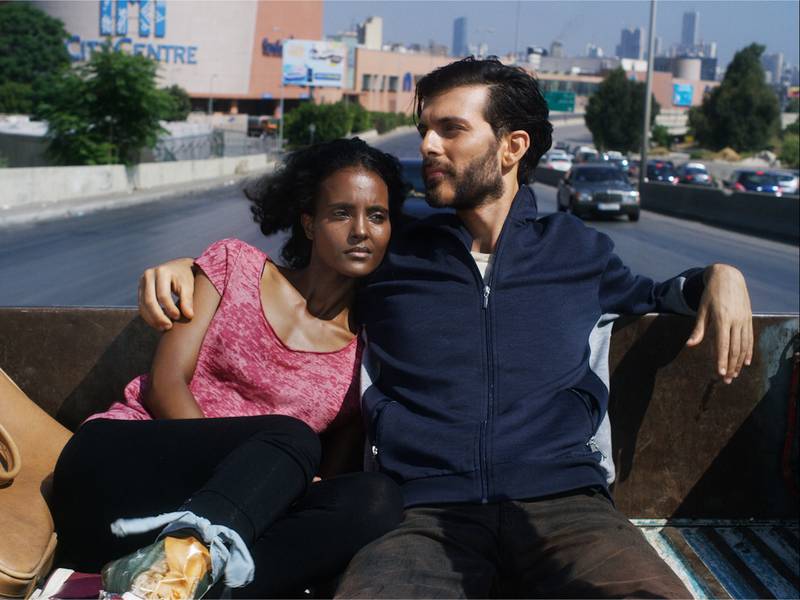
by thenationalnews.com — James Mottram — issam Charaf was only 9 during the 1982 Lebanon War. “The Israelis came in,” he tells The National over Zoom. “And the next day we’re having a walk in the woods, and I found something on the ground. I put it in my hand, and somebody told me: ‘Throw the … thing!’” He did, but that didn’t stop this grenade from exploding, leaving him badly injured and in hospital for three months. “It was a near-death experience.” Nor was it the only such injury this journalist-turned-filmmaker has endured. The port explosion in Beirut on August 4, 2020, left him with 70 stitches in his back. “There’s hardly any place left [on my body] for a third accident,” he says, sighing. And yet Charaf, 49, has vividly ploughed these ghastly experiences into his second feature, Dirty Difficult Dangerous, which opens the Venice Days strand of the prestigious Venice International Film Festival on Wednesday.
Set in Beirut, this curious blend of romance, social commentary and science fiction follows two people in love: a Syrian refugee named Ahmed (Ziad Jallad) and Mehdia (Clara Couturet), an Ethiopian working as a housemaid for an elderly couple. When we first see Ahmed roaming the streets, he’s trying to sell scrap metal. Gradually, we see his scars and shrapnel emerging from his body, something Charaf knows from personal experience. Scripting the film, he began to see Ahmed’s situation as a metaphor for the trauma Lebanese people have faced over the years. “People are going crazy. And they don’t like anyone. So I thought this film could be [about] a kind of crazy situation where nobody loves no one.” The phrase “nobody loves no one” was even a potential title for the film, one he felt rang true. “The Lebanese don’t like the immigrants, the Syrians don’t like the Ethiopians, and vice versa,” he says, speaking about Lebanon’s demographic tensions.
What emerges is something akin to the cult Japanese classic Tetsuo: The Iron Man, as Ahmed’s body begins to absorb the metal and transform into something almost cyberpunk-like. “What I was afraid of, what I didn’t want to do, was a social film,” says Charaf. “Because there have been endless films about Syrian refugees. Especially in the Arab world. And I was very afraid of spectator fatigue.” More than most, he knows this. Dividing his time between Beirut and Paris, Charaf spent years working for the European TV channel ARTE, covering not just culture but also the refugee crisis, as Syrians crossed the border into Lebanon. “When the Syrians came, we told them ‘Welcome.’ And it was a welcome from the heart,” he says. “But as years passed on, as the economic situation deteriorated in Lebanon, attitudes changed.”
This idea of “spectator fatigue” is why he feels it’s taken so long for Dirty Difficult Dangerous to get made. Ironically, he first started scripting the movie in 2012 when he was covering the Venice film festival as a cameraman for ARTE. Every morning, others in his team would go and watch films, and he would sit in a cafe and write scenes. Now, he’s about to present the movie at the festival. “It’s an amazing coincidence,” he says. What critics and audiences make of the film will be intriguing — with black humour vividly mixed into the pot. Comparisons can be made to the melancholic-but-mirthful works of Jim Jarmusch, Aki Kaurismaki and Elia Suleiman. Charaf, who didn’t go to film school, has spent years watching world cinema, soaking up inspiration. “There’s always influences,” he says. “I mean, every director is influenced by other directors. It’s organic.”
The film will also open up a perspective on Middle Eastern society to international audiences, through the character of Mehdia, the Ethiopian working in Lebanon as a servant. Employed by ageing couple Leila and Ibrahim, who is gradually slipping into dementia, she finds herself living and working in harsh conditions which Charaf says are widespread in Lebanon. Couturet, who plays Mehdia, had never been to Lebanon, and was shocked by this aspect of the story. “She was horrified when she was discovering these scenes. I mean, she was like, ‘This is so cruel. This is so horrible.’ And Darina [Al Joundi] who played Leila, was trying to explain to her ‘Darling, this is what good families do. You don’t want to know what the bad families do!’”
Venice Film Festival leaps into the metaverse with Coco Chanel and ‘Peaky Blinders’ worlds Yet, Charaf’s film isn’t as depressing or dour as it might sound, especially with Ahmed and Mehdia growing romantically involved. “It’s like a masala — an Indian tea,” suggests the director. “You need to find the right balance, of cruelty and tenderness, at the end of the day. Again, it’s a love story. It’s not a soci



